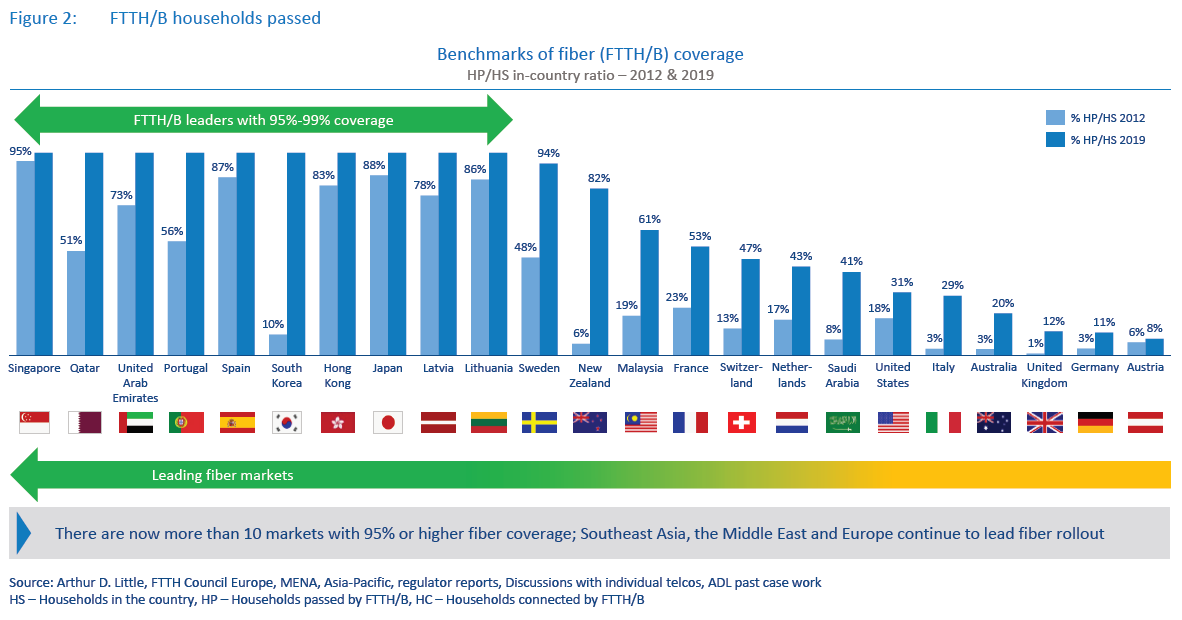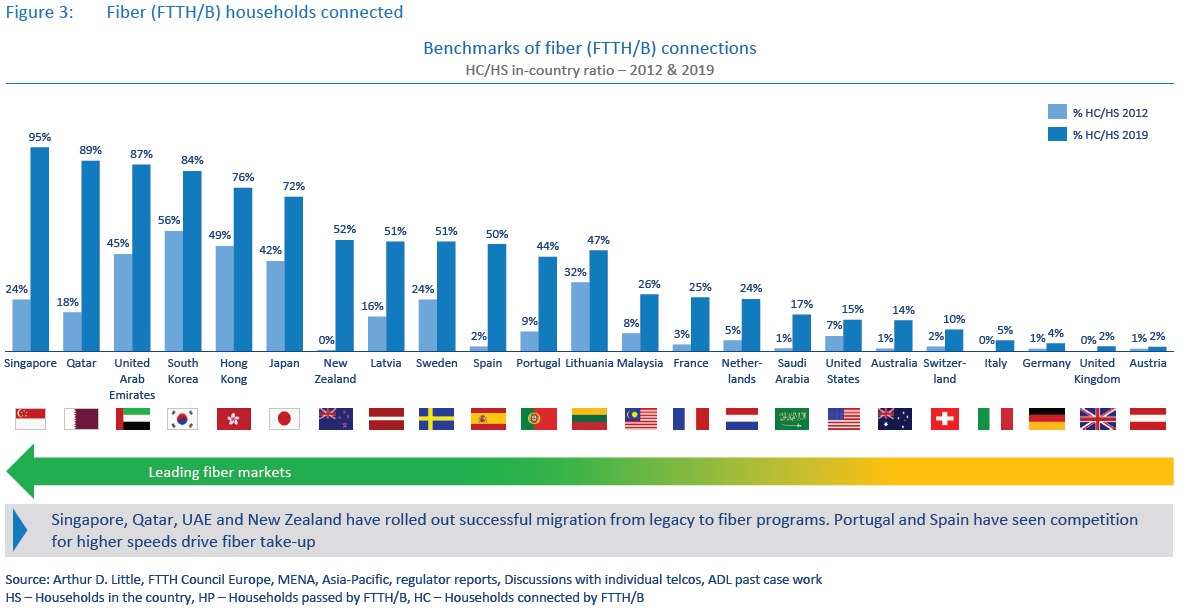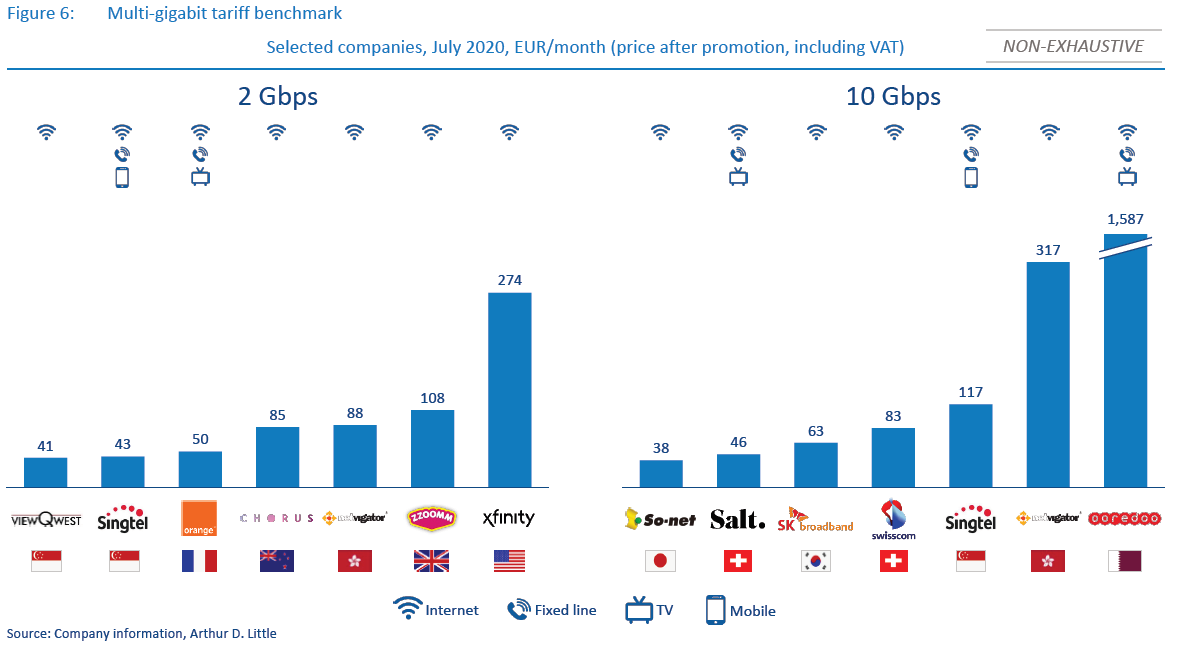UK Trails as 10 Countries Pass 95 Percent Full Fibre Broadband Cover

A new report from global consultancy firm Arthur D. Little has revealed that 10 countries have now made “full fibre” (FTTP / FTTB) broadband ISP networks available to at least 95% of homes, although unsurprisingly the United Kingdom continues to be stuck at the back of the pack but we are showing rapid improvement.
The report itself – ‘The race to gigabit fiber‘ (yes that should be “fibre,” but they can’t help being American) – doesn’t really add anything new to the debate that we haven’t already covered before (examples here, here, here and here), but it does help to put the UK’s position into a more up-to-date context with some of the world’s other major markets for gigabit-capable fibre connectivity.
Overall, the United Kingdom is shown to have improve its FTTP/B coverage from 1% in 2012 to 12% at the end of 2019 (this seems to be roughly aligned with Ofcom’s data), with some 2% of households now being connected to such a service. Sadly, these figures put us right at the bottom of the table, but again we already knew that from past reports.
Advertisement
The key thing to remember here is that deployments over the past couple of years have been ramping up significantly as a result of various changes, such as the business rates holiday on new fibre, various regulatory changes by Ofcom (e.g. easier access to Openreach’s existing cable ducts and poles), public investment (BDUK, voucher schemes etc.) and a large influx of private investment for alternative networks that has driven competition (e.g. BT’s £12bn plan to cover 20 million premises after 2025).


The Government’s future programme to invest a further £5bn (focused on the final 20% of hardest to reach premises), which aims to ensure that “every home” can access “gigabit-capable” broadband by the end of 2025 (though this may be watered down), will no doubt help to further accelerate the UK’s fibre build. We should add that this is being support by various other changes (e.g. gigabit broadband for new build homes and opening up access to utilities infrastructure for sharing etc.).
Advertisement
Nevertheless, we are still stuck playing a long game of catch-up and nothing is going to change that reality for a while, but at least things are finally going in the right direction.
Arthur D. Little’s Report said:
“In almost all fiber-leading markets, the incumbent has taken a principal role in rolling out nationwide fiber. However, in an increasing number of European countries, alternative operators or new open access fiber entrants have secured billions of euros to deliver promised nationwide fiber coverage in the next four to six years, potentially becoming new future fiber leaders in their respective markets. Such entities include, for example, Open Fiber in Italy, CityFibre in the UK, Swiss Open Fiber in Switzerland and Deutsche Glasfaser and inexio in Germany.
In the case of Germany, the two alternative providers, Deutsche Glasfaser and inexio, which target mostly rural and underserved suburban areas, have announced plans to deploy fiber to approximately 8 million additional homes by 2030, moving the coverage from a current 11 percent up to approximately 28 percent. Saudi Arabia is also betting on boosting its FTTH performance by launching a new open access initiative in cooperation with all operators in the market.
The take-up rates of fiber services have increased in line with the improved coverage, driven by effective migration strategies. Since 2012, the average take-up rate has grown from 15 percent to 42 percent among the benchmark countries.
The report also shows how competition in the full fibre market will ultimately fuel the emergence of even faster multi-gigabit broadband packages for homes. We’ve already seen some ISPs like Black Fibre (Telcom) and B4RN launch a 10Gbps tier in the UK, while Zzoomm also has a 2Gbps service, although these are currently the exception rather than the rule, due to their limited coverage.
However, for other markets with better coverage, multi-gigabit packages for consumers are becoming much more common and some are surprisingly affordable. Admittedly there’s still a big question mark over how much of that advertised speed is actually available (not all markets have the same strict advertising rules as we do) and the difficulty of harnessing such speeds in the real-world, but such things often mean very little in the marketing game.

Advertisement
However, in the majority of markets, multi-gigabit tariffs are still considered a luxury that demands a premium. In some cases, the premium is almost prohibitive. Ooredoo in Qatar charges approximately €1,600/month for its 10Gbps plan.. we’ll pass on that, thanks.
All of this talk about gigabit speeds and full fibre will of course be extremely galling to those still stuck living in locations where even getting 10Mbps+ remains prohibitively expensive. Likewise, it remains to be seen whether the Government’s latest £5bn programme will finally be able to resolve those problems or become another failure to deliver.
Mark is a professional technology writer, IT consultant and computer engineer from Dorset (England), he also founded ISPreview in 1999 and enjoys analysing the latest telecoms and broadband developments. Find me on X (Twitter), Mastodon, Facebook, BlueSky, Threads.net and Linkedin.
« ISP Community Fibre Complete Full Fibre Build in Sutton Early
KCOM Reintroduces Broadband Data Caps as COVID19 Surges »






















































The progress that New Zealand made in just eight years is staggering.
South Korea looks far more impressive.
South Korea have also come a long leaps and bounds from 2012! Amazing to see. Unfortunately, I am of the mind set that we will always be playing catch-up when it comes to broadband and infrastructure. Other countries seem to have the ability and initiative to steam ahead in this regard… Except perhaps Germany which was a little shock to me.
I agree. South Korea looks phenomenally impressive. I was also surprised that Germany lags.
There is obviously something majorly wrong in the UK. How else to explain Portugal, Latvia, Lithuania and Sweden – all of which are in Europe – miles ahead of us?
The benchmark should be for the UK to match places like Singapore and South Korea.
We really need stop-sell on ADSL and FTTC anywhere FTTP is available, not just at exchange level, ASAP.
A property has FTTP purchased they never get the copper again. A property has FTTP available but is on FTTC/ADSL the CP gets a period of time to migrate the customer to FTTP before the copper is terminated.
Progressively at premises / PON level should reduce the bursts of installs required. Grace periods on old products waiting for migration and the staggering of contract period ends should help.
Brexit might (assuming gov time/interest) allow them to push that much harder as sans some the EU competition law it would be easier to close things down. At the moment there is a lot of potential legal challenges…
@joe: Nobody has prevented BT or other telecoms from deploying fibre for many years now. It’s mostly down to wrong policies and poor decisions in the past that caused the telecoms failure to do a proper job.
@GNewton No you’re missing the point. Its around stop sell. Closing LLU/ADSL etc to go all fttp could lead to litigation done in any short time frame.
“We really need stop-sell on ADSL and FTTC anywhere FTTP is available” – I think this would be a good idea, as long as there was a FTTP tier that provided similar pricing to ADSL including telephone.
However, I’d prefer priority to be given to making FTTP available to areas (inc. EO lines in FTTC areas) that still only have ADSL available.
@joe: I agree with the need to switch off DSL services where fibre is available as soon as possible. However, this has nothing to do with the EU, telecoms in this country could have built fibre ages ago!
Talking about a stop-sell for DSL is a moot point here because of the fact that the majority in this country doesn’t even have fibre in the first place.
You can’t undo past mistakes and sheer incompetence on the part of telecoms like BT or past governments from one day to another, the UK will remain a backwards place for many more years to come with regards to fibre broadband.
World leading connectivity! Just not here…
Haha that’s just embarrassing for the U.K. market! I mean I’m in an FTTC by Open Reach, therefore as I understand I have zero chance of anyone else providing me with fibre broadband to the doorstep, and I have to wait till I move house, or Open Reach feel generous enough to upgrade my line, or I pay them several thousand to do it for me. What a market. Meanwhile others are getting fibre from other providers and network builders,
Whilst it shows a significant disparity regarding countries that embraced a FTTH strategy rather than a VDSL one (like the UK) I have to question where they got their data. The graph specifically says 2019. So is Spain at 95%? Their Ministry of Economic Affairs and Digital Transformation says they are just over 80% FTTH coverage.
However with 61,778 premises to cover they are clearly following a better strategy than our Department for Digital, Culture, Media & Sport (DCMS). Particularly as they have the same coverage issues as us. Note, they have 50% covered by HFC which is about the same as us and only 72% covered by ADSL. Therefore there is approaching 20% who must be still surviving on other fixed technologies at low speed or utilising 4G (99.8%). They have recently announced £15Bn to support further fixed and 5G networks.
What we need is clear commitment and plan from the UK Government/Ofcom and an end to drip fed subsidy so the UK Industry can plan accordingly.
Impressive improvements by South Korea especially. Clearly the UK is lightyears behind and there is no excuse.
To paraphrase a film, I do not share the optimistic appraisal of the situation by the powers that be here. It is evident that the UK consumer has been taken for a ride and the achievements here benchmarked far too low.
Portugal, Latvia, Lithuania and Sweden are all ahead of the UK. Singapore has done wonders. South Korea should be the new benchmark and the UK should be “getting it done” with regards to completely modernising the telecoms/internet infrastructure of this country. I doubt we would look particularly advanced with regards to our trains as well.
Even the French are ahead of us. The French! This is completely unacceptable.
If the UK wants to claim to be a top notch nation in the era of 5G, Full Fibre FTTP, the internet of things, smart technology, working from home, etc etc, then there needs to be a complete rethink and overhaul of how infrastructure is built, managed and priced in this nation.
Nobody has prevent BT or other telecoms from deploying fibre for many years now. It’s mostly down to wrong policies and poor decisions in the past that caused the telecoms failure to do a proper job. manage and price in this nation.
BT wanted to do FTTP in the 80s. You can thank Maggie for squashing the ability to do so.
Thatcher is dead, and this an era long gone. This is not an excuse for today’s Can’t Do culture.
Nobody has prevented telecoms, including BT, to install fibre for more than a decade now, except for their own incompetence.
@GNewton – but the facts still stand. Were it not for her, we would not be in this situation. Either way, we should not still be in this situation, but we could have been way out in front were it not for her.
@SimonR – Like you said, whilst Fibre should have been started back then, it does not excuse rank incompetence and buffoonery today, nor continued mediocrity as we go into the future. Clearly the UK is lightyears behind and there is no excuse.
To paraphrase a film, I do not share the optimistic appraisal of the situation by the powers that be here. It is evident that the UK consumer has been taken for a ride and the achievements here benchmarked far too low.
Portugal, Latvia, Lithuania and Sweden are all ahead of the UK. Singapore has done wonders. South Korea should be the minimum new benchmark and the UK should be “getting it done” with regards to completely modernising the telecoms/internet infrastructure of this country. I doubt we would look particularly advanced with regards to our trains as well which are a bad joke versus places like Japan, or Switzerland, or China. Hong Kong’s MTR is fully profitable, affordable for consumers and lightyears ahead of trains here.
Even the French are ahead of us in Fibre. The FRENCH! This is completely unacceptable.
If the UK wants to claim to be a top notch nation in the era of 5G, Full Fibre FTTP, the internet of things, smart technology, working from home, etc etc, then there needs to be a complete rethink and overhaul of how infrastructure is built, managed and priced in this nation. We should be miles ahead of France for goodness sake.